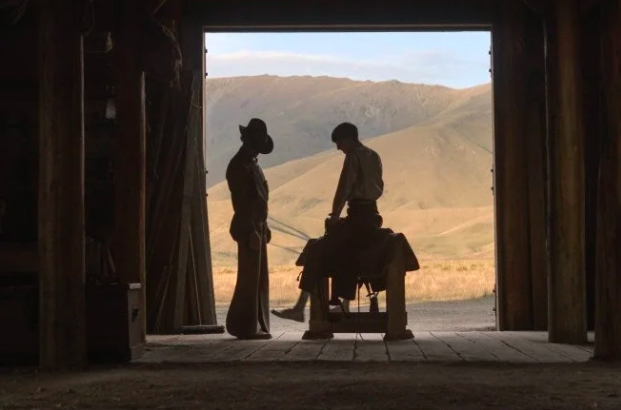By Pen Fang
“Deliver my soul from the sword; my darling from the power of the dog.”
Based on the novel by Thomas Savage, The Power of the Dog welcomes you to a Western psychological drama. Jane Campion directs her first feature film since 2009’s Bright Star, also serving as a writer and producer. We are introduced to the Burbank brothers, Phil (Benedict Cumberbatch) and George (Jesse Plemons), ranchers living in 1925 Montana. The two brothers are polar opposites: Phil is known for his cruel nature, whereas George is respectful and much kinder. When introduced to Rose (Kirsten Dunst) and Peter (Kodi Smit-McPhee), George falls in love and marries Rose while Phil torments them — until he decides to befriend Peter.
The film itself rides a slow build. Campion takes her time with the storytelling, carefully unpeeling the layers of the plot. It weaves together a story that ultimately clicks, then lingers. The writing delivers a compelling plot that allows the story to flow but also take its time and sink in. She creates complex characters, characters with flaws that we still care about. Further, each of the characters has underlying intentions, slowly revealed as the film begins to unmask itself. The Power of the Dog is a film about power dynamics, a subtle portrayal of the struggle between a young man and a tyrant that ultimately raises the question: who is the predator and who is the prey?
Along with predation, the theme of masculinity is explored. Peter is comfortable where he stands; we are introduced to him as he cuts paper flowers, a far cry from what Phil expects of masculinity. In fact, his lack of traditional masculinity becomes a sort-of weapon. Peter is tender and gentle and is free with it, whereas both Phil and George repress their emotions. Both men are lonely — but one lets it consume them, and the other escapes it. With Phil, Campion focuses on the loneliness that toxic masculinity fosters. He becomes a character that you can sympathize with through his own struggles with masculinity, and how it isolates and traps him. He pushes everyone away with his cruel attitude and suffers from it, becoming the tragedy. For Phil, traditional masculinity becomes a cage for his desire and yearning.
Cumberbatch’s performance encapsulates Phil in a way where he maintains the harsh angles and rage yet manages to make him a character that can be sympathized with. His acting in this film is some of the best of his career. Smit-McPhee and Dunst also have brilliant, compelling performances, though Plemons feels a bit under-utilized.
In relation to the film’s title, Campion said, “The power of the dog is all those urges, all those deep, uncontrollable urges that can come and destroy us.”

